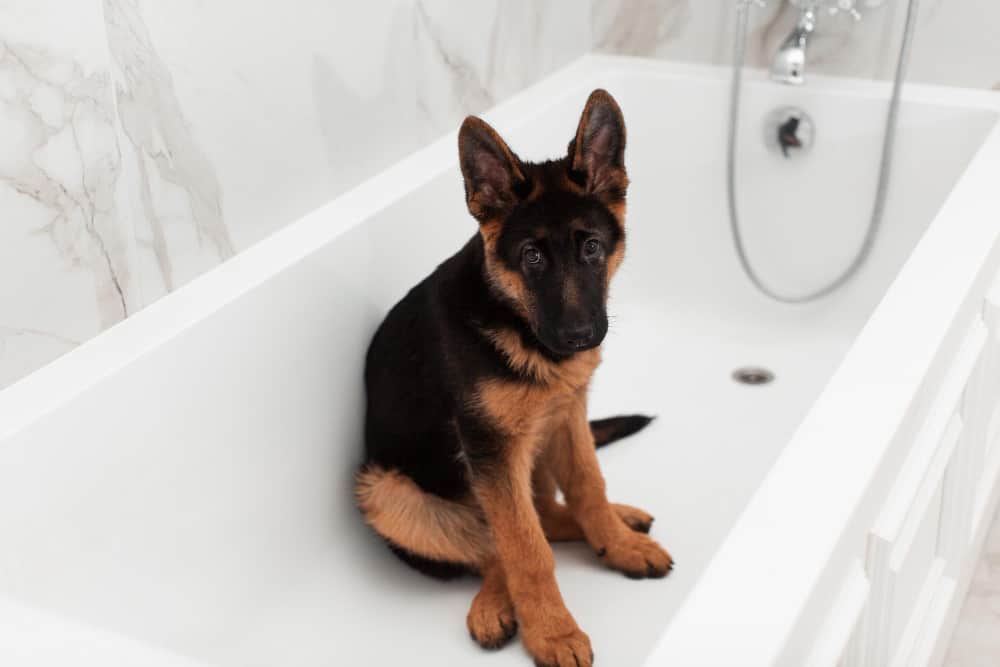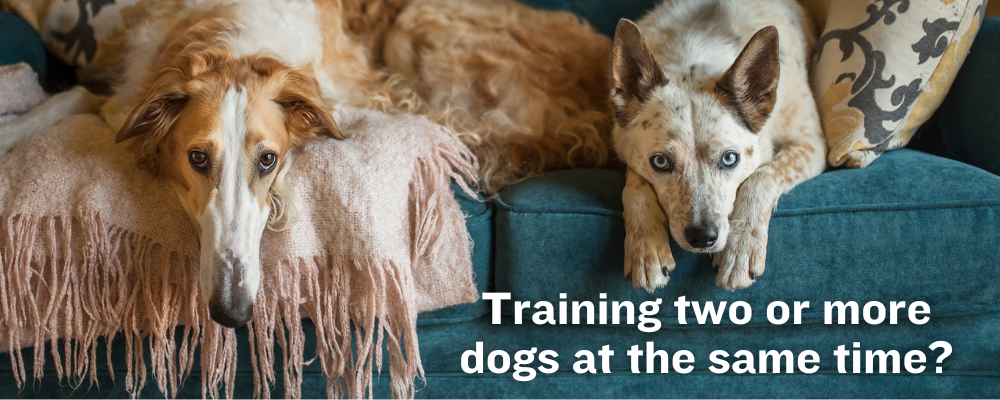Eat.Poop.Play.Sleep.Repeat. This is the basic formula for any puppy’s schedule. Regardless, sleeping itself is super important for your German Shepherd puppy. If they are not having enough sleep, they will not have enough energy to fuel their physical and mental growth, learn and experience new people, places, and sensations.
On average, a German Shepherd puppy will sleep for 18 hours a day. Some pups sleep longer than the others but they usually sleep between 15 and 20 hours in a 24-hour period. Your pup will regularly need to wake you up 2-3 times a night to go potty.
In this article, we will answer the most commonly asked questions about the sleeping habit of your German Shepherd puppy. Our goal is to give you enough information to let your new furry friend get the best sleep in his new home.
And ultimately, better sleep can make your German Shepherd puppy healthier, grow stronger, and learn faster. Let’s get started.
How important is sleep for German Shepherd Dogs?
Do you know sleep is an integral part of every puppy’s growth both physically and mentally? Just like a human baby, your new puppy needs a lot of sleep for this precious time of its life.
“Sleep is essential to healthy growth, contributing to the necessary development of his central nervous system, brain, immune system, and muscles. All of that sleep also helps him rest up during growth spurts.” (AKC)
A dog deprived of sleep is not only more prone to sickness but also has a huge effect on mood state.
How many hours should a German Shepherd puppy sleep?
On average, a German Shepherd puppy will sleep for 18 hours a day. Some pups sleep longer than the others but they usually sleep between 15 and 20 hours in a 24-hour period.
As puppies get older, they sleep less. The average 4-month-old puppy sleeps a little over 11 hours in a day. And the average adult sleeps 10-11 hours in a 24-hour period.
Do a German Shepherd puppy sleep through the night?
Before the 6-month mark, German Shepherds will probably not sleep through the night. And here are some of the reasons:
- They aren’t used to sleeping without their littermates and mother.
- They may feel insecure with all the new smells and noise in their new home. This change may be exciting or nervous for them to settle down and sleep.
- At the age of eight weeks old, your puppy’s bladder will not be big enough to retain them for the entire night. They’ll whine or cry if they feel the urge to go.
How long until a puppy can sleep through the night?
It may take as long as 1-2 months for your new puppy to settle in the new home and feel more secure to sleep through the night.
When he reaches 4-6 months old, he will gradually decrease the potty calls from twice to once a night.
How many times does a puppy need to go for a potty break a night?
Your pup will regularly need to wake you up 2-3 times a night to go potty.
Should I wake my puppy up at night to pee?
You should wake your puppy up to pee at night to avoid accidents.
Once a puppy reaches 4-6 months old, they will have almost a full-sized bladder and are able to hold in their urine for longer. With proper potty training, you and your dog might get through the night without wet incidents.
Why is my German Shepherd puppy crying at night?
- Because they’re scared
- Because they’re lonely
- They’re hungry
- They need to go to the toilet
How to stop a german shepherd puppy crying at night?
There are many different reasons that your pup may be crying at night. Fortunately, there are also lots of ways to help him sleep better at night. Here are a few of the ways you can stop your german shepherd puppy from crying at night:
Exercise to tire your German Shepherd puppy out: Your puppy should be taken out for 5 minutes for however many months old they are. For example, a 3-month-old puppy would be taken out for 15 minutes. Make sure you tire them out enough to help them sleep better at night.
Let your German Shepherd puppy outside before bed: Make sure you let your puppy outside to relieve himself before putting him to bed.
Let your German Shepherd puppy sleep in your room: When you first get your german shepherd home, he’s not used to sleeping without their littermates and mother, letting him sleep by your side in a crate can let you comfort him during the night.
Surround your German Shepherd puppy with familiar objects: Bring clothing with the scent of the home or the breeder next to him while he sleeps. This will help give him something familiar and help him ease into the transition to his new home.
Make sure your German Shepherd puppy is comfortable: Although they’re not going to feel as comfortable as when they were in their den (the place they grew up in) you can still make them feel better with a comfy crate, blankets, snacks, stuffed animals, etc.
Play soothing music: Playing classical music before and during bedtime can help alleviate whining and anxiety as well as drown out other noise or unfamiliar sounds that may upset or rouse your puppy.
If your puppy has been crying in her crate at night, watch this video to get the best tips to stop it from happening :
How do dogs’ sleep routines differ from humans’?
Dog’s sleep cycles are much shorter than human sleep cycles. The average dog sleeps for only 45 minutes at a time, while human sleep cycles are much longer, lasting 70 to 120 minutes.
Dogs can only experience two sleep cycles during that time period. And the length of a human’s sleep cycles increases as the night goes on.
Your dog only cycles through REM twice and spends an average of 6 minutes in REM each time. Over a night’s sleep, we may spend up to 25% in REM sleep, and we cycle from non-REM to REM several times.
Dogs also differ from humans in that they are polyphasic sleepers, which means they sleep on and off throughout the day.
Humans, on the other hand, are monophasic sleepers. Most humans receive their 7 to 9 hours of sleep all at once.
While humans spend most of their waking hours awake and alert, dogs dedicate up to 5 hours of their day to simply resting.
In total, nearly 14 hours of a dog’s day is spent in some form of sleep or relaxed drowsiness, on average. This relaxed state is important to a dog’s overall health. Dogs who rest more during the day tend to seem happier and more relaxed.
Do dogs dream and what about?
Dreaming occurs mainly during this REM phase of sleep. And dogs do cycle through REM during their sleep. So its make sense to believe that dog do dream.
A puppy will spend more time in dream sleep than an adult dog as they fall asleep more often. So just what are our furry friends dreaming about?
Anything your dog does during the day is being processed while they sleep and relived in their dream. Dreaming is your dog’s attempt at understanding the information being processed in their brain. This can be observed by their twitching whiskers, the whimpering, and the running paws while they are sleeping.
Chances are that your dog may also be dreaming about you if you spend enough quality time interacting with them. They will be dreaming about your play session, walks, and cuddle time together.
Where should my German Shepherd puppy sleep?
German Shepherd puppies should sleep inside with comfortable beddings. This is because if your puppy has too much space to roam, it will be harder to get them potty trained as they will just find a spot to do their business away from where they are sleeping.
You can place the crate beside your bed or in an area close to you. In this way, your new furry friend can smell you. And it gives him a sense of security. If he starts crying (it’s rather common for the first couple of nights) you can put your hand to comfort him.
After your puppy gets used to the crate by your bed, you can gradually move his crate out of your bedroom if you don’t plan to have him sleep near you every night.
Should I sleep with my German Shepherd puppy?
You should not sleep with your German Shepherd puppy during the first few months home. Yet you can let your pup sleep beside you in a crate or a dog bed.
Your puppy needs to get used to a regular schedule, work on their independence, and see you as the dominant figure. Once your GSD has become an adult (18-months-old to 2-year-old), it will be fine for you to sleep with him.
Can I let my German Shepherd puppy sleep with me?
A new dog may need some time to adjust before they are ready to sleep in your bed.
If your dog is too young and still having accidents, it’s better to crate train them before allowing them to sleep in your bed.
If they show interest in sleeping with you (and are well-behaved), you can always let them on the bed later on down the road.
What are the benefits of sleeping with dogs?
If you are still reading, chances are you might like to sleep with your dog at night. Pets offer comfort and security, but they may affect sleep quality or trigger allergies for some people. Yet, research and owner’s experience have suggested that sleeping with a pet can provide a variety of benefits, let’s look at some of them:
Sleeping with dogs makes you healthier
Interestingly, owning a dog is correlated to a reduced risk of death – more or less related to the fact that being with dogs can decrease cholesterol and triglyceride levels and lower blood pressure.
Petting dogs in particular has proved to reduce blood pressure and heart rate. If touching your pet is part of the key to gaining health benefits, cuddling up together at night is only to make it better.
Sleeping with dogs promotes creativity
Studies have shown that when dogs are with their owners their heartbeats sync up. This experience promotes theta brainwaves which can be seen in connection with creativity, intuition, daydreaming, and fantasizing and is a repository for memories, emotions, sensations. Theta waves are strong during internal focus, meditation, prayer, and spiritual awareness.
Sleeping with dogs boost your mood
Studies have found that people who spend time with dogs reported fewer depressive symptoms. Not only is it fun to be with your furry friends, it also helps us relax and increases our flow of oxytocin, the love chemical.
Sleeping with dogs makes you feel safe
Think about it — your GSD is hard-wired to protect. Many people and having the dog protecting them helps them feel more secure and sleep more soundly.
Sleeping with dogs is comfortable
That furry, cuddly animal is likely to love lying with you just as much as you enjoy laying with them. The level of comfort a dog brings to the bed helps put you at ease and makes you feel cozy.
Sleeping with dogs promote immunity
Many people have hygienic concerns when it comes to sleeping with their dogs. However, one study found that infants who slept with their pets were less likely to develop allergies later on in life.
Conclusion
We hope we’ve given you a comprehensive view of getting your puppy the best sleep solutions. After all, your new furry friend will sleep for at least 15 hours per day during their short lives. And the better they sleep, the healthier and happier they are.
Further reading
Sleeping with Pets (Source: Sleep Foundation)
Tips for Safely Sleeping with Your Dog (Source: Casper.com)
More posts on German Shepherd Puppies

Recommended post
German Shepherd Puppy – The Ultimate New Owner’s Manual
Health and care
- German Shepherd Puppies: Everything You Need to Know
- Bringing Your German Shepherd Puppy Home for the First Time
- How Much Does A Purebred German Shepherd Puppy Cost?
- $500 German Shepherd Puppy For Sale: Does it Make Sense?
- German Shepherd Puppy Crying: Owner’s Guide
- How to Stop GSD Puppies From Biting: 7 Owners-Proven Tips That Work
- When Will My German Shepherd Puppy’s Ears Fully Stand Up?
- German Shepherd Puppy Sleeping Guide: Everything You Need To Know
Training, socialization, and behavior
- 10 Best Training Tips for German Shepherd Puppy
- German Shepherd Puppy Socialization: A Beginner’s Guide
- How To Tell If a German Shepherd Puppy Is Aggressive
Feeding



